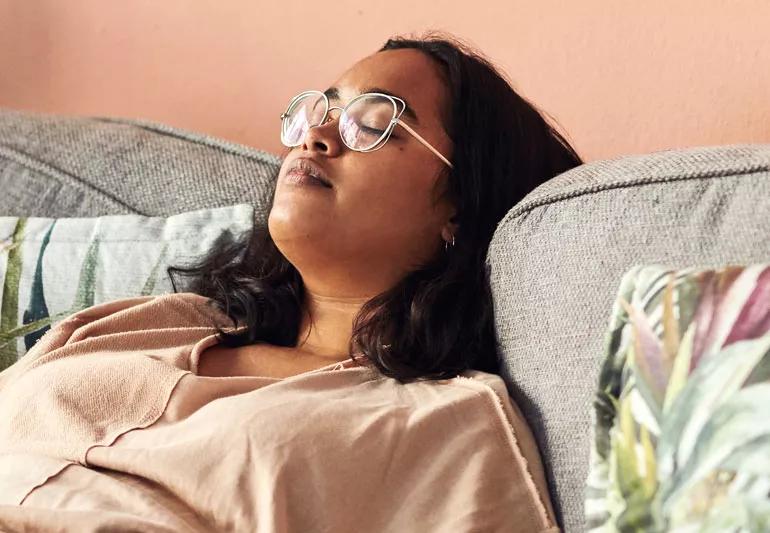Diet, exercise and sleep all critical to heart health

Image content: This image is available to view online.
View image online (https://assets.clevelandclinic.org/transform/221676cf-9258-4494-8c7c-08be9e4d1340/womanSleepingCouch-1257761561-770x553-1_jpg)
woman sleeping during day on couch
There’s definitely more to keeping your heart healthy than eating right and exercise. Getting the right amount of sleep is also important. People with chronic sleep disturbances such as insomnia and sleep apnea have a shorter life expectancy compared to those who consistently sleep well.
Advertisement
Cleveland Clinic is a non-profit academic medical center. Advertising on our site helps support our mission. We do not endorse non-Cleveland Clinic products or services. Policy
“Sleeping a solid seven or eight hours per night is a marker of good heart health,” says cardiac surgeon A. Marc Gillinov, MD. “Exactly how sleep influences the coronary arteries is still being studied, but we do know that not getting enough sleep is associated with risk factors for heart disease.”
For the majority of adults, getting between seven and eight hours each night is the optimal amount of sleep. But that number seems difficult to reach. Research from the National Sleep Foundation found that 35% of Americans report their sleep quality as “poor” or “only fair.” And about 63% of Americans say they’re not getting enough sleep during the week, reporting an average of six hours and 55 minutes per night.
“It’s best to respect your body’s need for sleep, aiming for seven to eight hours per night,” Dr. Gillinov explains.
He says that people who sleep less than six hours per night tend to have more cardiovascular risks than those who sleep longer, including:
Not getting enough sleep can do far more than give you bags under your eyes. American Heart Association researchers found that a lack of sleep is associated with increased calcium buildup in the heart’s arteries.
Advertisement
So, why is calcium important? When calcium builds up in your arteries, this causes plaques that can put you at risk for a heart attack. In the study, just one hour less of sleep each night increased risk of calcium build-up in arteries by 33%. And people who slept less than six hours per night had the greatest risk of developing changes in the arteries of the heart.
Not getting enough sleep also reduces your body’s production of certain appetite-suppressing hormones, which may lead to weight gain. Have you ever been tired and pulled yourself through the day with sugary snacks? Several studies have linked not getting enough sleep to a rise in ghrelin and a reduction in leptin — hormones that regulate your metabolism, compared with those who enjoyed a full night’s sleep. (By the way, ice cream was the preferred food among those who were tired!)
Dr. Gillinov says research shows that people who sleep too long — more than nine hours each night — also may have an increased risk of heart disease. But it also may be possible that they may stay in bed for more hours because they are already unwell.
There are several steps you can take to achieve healthy sleep patterns and help your heart too, Dr. Gillinov says.
Finally, when it comes to monitoring your sleep, make sure that you don’t have sleep apnea (a sleep disorder that causes you to stop breathing repeatedly while you’re asleep). Ask yourself two questions: Do you feel tired during the day? Do you snore loudly? If the answer to both questions is yes, ask your doctor about a sleep study to find out if you might have sleep apnea.
By taking these steps, you’ll feel better, sleep better and be doing your heart a favor.
Advertisement

Sign up for our Health Essentials emails for expert guidance on nutrition, fitness, sleep, skin care and more.
Learn more about our editorial process.
Advertisement
Sleep masks can help you create total darkness so you can sleep better
To avoid sleep deprivation and shift work sleep disorder, try adopting habits that minimize light exposure and prioritize daytime sleep
Sleep disorders, mental health conditions and other health concerns can all affect the quality of your sleep
Most people fall asleep within 10 to 20 minutes, but if your experience is different, adjusting your sleep schedule may help
Stick to a consistent schedule, be mindful of screen time and work on reducing your stress levels before bed
Napping can boost focus, memory and mood — if you time it right
These devices can help shed light on what’s happening with your body during rest
Keep a dream journal, set your intentions before bed and make sure you’re getting a full night of high-quality sleep
Prioritize your health by managing stress, strengthening your social connections and getting quality sleep
Bolsters, blankets, pillows and blocks can offer extra support, stability and comfort
Allergies, postnasal drip, asthma or reflux could be to blame for a cough that won’t quit